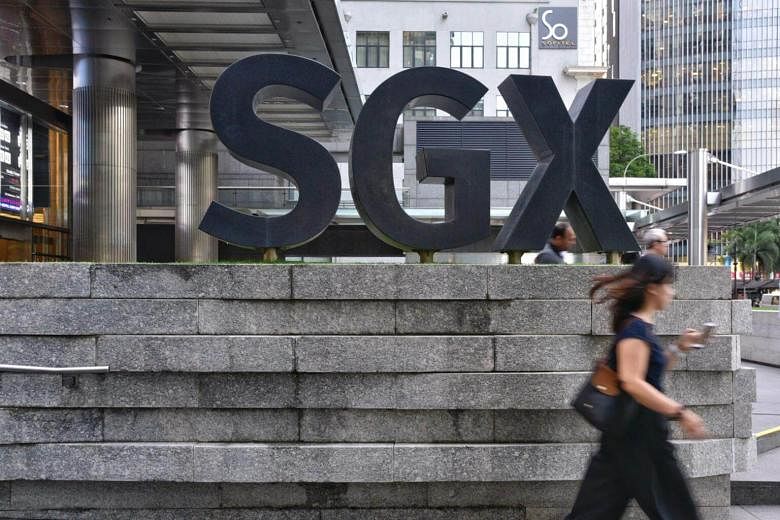SINGAPORE (THE BUSINESS TIMES) - The local stock market rally during the latter half of 2017 has propelled the Singapore Exchange (SGX) into the "trillion-dollar club", but more consolidation is expected with China companies still hungry for mergers and acquisitions (M&As).
While delistings may be normal in capital markets, their extent is worrisome in Singapore, where more than S$12 billion in market value was erased in 2017 as a result of listed securities losing their listing status. The figure is almost 40 per cent higher than the S$8.7 billion in market value generated by newly-listed companies in the same period.
Delistings also raised alarm bells in 2016 when several high-profile and large-cap companies like Neptune Orient Lines, SMRT Corp, Tiger Airways and OSIM International were privatised. At the end of 2016, S$15.9 billion in market capitalisation was lost from delistings, up from S$8.9 billion in 2015, according to The World Federation of Exchanges (WFE). WFE also showed new listings added only S$6.4 billion in market value at the end of 2016. Experts say delistings will continue in 2018 even as the pipeline for initial public offers (IPO) look robust.
"Possible delistings will include companies across all sectors which may choose to be closer to the market they serve and to build product and brand recognition there, as well as those which believe that they are not garnering sufficient value and interest from investors on the SGX. The robust mergers and acquisitions environment and availability of funds will also result in companies being bought over and privatised," says Max Loh, EY Asean and Singapore managing partner.
Tham Tuck Seng, PwC Singapore's capital markets leader, believes delistings will also be fuelled by China firms' appetite for overseas expansion.
"While the general perception is that the lower valuations on the SGX have led to the privatisations, the latter is also the consequence of China's 'One Belt, One Road' (OBOR) initiative where mainland enterprises are encouraged to internationalise,"' Mr Tham said. OBOR is a large-scale development and infrastructure programme announced by Chinese President Xi Jinping in late 2013 to connect China to Europe, Africa and Asia by road, rail and sea.
In fact, last year saw three major Singapore-listed logistics groups targeted by Chinese groups: Global Logistic Properties (GLP) by consortium Nesta Investment Holdings, CWT by HNA Group, and Cogent by shipping giant Cosco Shipping International. Nesta is owned by HOPU Logistics Investment Management Co, Hillhouse Capital Logistics Management, SMG Eastern, Bank of China Group Investment and Vanke Real Estate (Hong Kong) Co.
Stefanie Yuen Thio, joint managing partner at TSMP Law Corporation, says companies involved in such delistings were victims of their own success.
"It's a success story when a company that grows from a startup to a listed company is so successful that an acquirer comes along to buy it up. The SGX may have lost one listing but this is also a testimony of how well it has helped that company to grow," Ms Thio says. She expects to see further consolidation in the logistics market as large international investors develop an appetite for home-grown logistics companies.
"We may also see more consolidation in the shipping as well as oil and gas sectors as they continue to restructure,'" Ms Thio said.
Barry Lee, partner and head of Capital Markets Group at KPMG in Singapore, believes that IPOs on the SGX will be underpinned by the robust global economic outlook this year.
"Such optimism is carrying over to Singapore as well. Even though there are available funds chasing after companies and giving them the option to raise private capital instead of an IPO, the local equities market looks promising and we are likely to see a healthy pipeline of listings this year.
"A space to watch might also be SGX's recent collaboration with Nasdaq, and how SGX is using this collaboration to engage listed companies in developing and broadening their US investor base which will in turn make the bourse more relevant and attractive," Mr Lee said.
PwC's Mr Tham expects the number of IPOs in 2018 to at least match last year's. In a recent report, PwC highlighted that SGX could attract listing aspirants from business trusts and reits as well as the food and beverage sector.
Investment bankers told The Business Times that potential IPO candidates include companies owned by private equity funds such as Crystal Jade Group and Imperial Treasures. The former is majority-owned by L Catterton, a private equity fund backed by luxury goods giant LVMH, while the latter by Malaysian private equity firm Navis Capital Partners. Other candidates include Italian restaurant operator Pastamania and seafood processing company Fassler Gourmet.
Other candidates may also come from the healthcare sector, which is enjoying relatively attractive valuations. Last year saw only one healthcare stock - Clearbridge Health - listed. According to SGX Research, Singapore's 10 largest capitalised health care stocks have averaged 3.3 per cent price gains for the first five sessions of 2018, following on from an averaged 13.2 per cent price gain in 2017.
While some quarters have blamed higher listing costs and onerous compliance demands on the SGX for the slew of exits, experts disagree, arguing that the SGX remains an attractive platform for fundraising.
"Delisting is not something within SGX's control. I don't see the listing fees and costs as a problem," PwC's Mr Tham said, adding that the listing expenses of Hong Kong Stock Exchange (HKEx) and SGX are actually quite comparable.
"In fact on a case by case basis, they can be higher on HKEx," Mr Tham said.
EY's Mr Loh highlighted that SGX practises a disclosure-based regime that sets out to create a level playing field and that "should be appreciated by investors".


